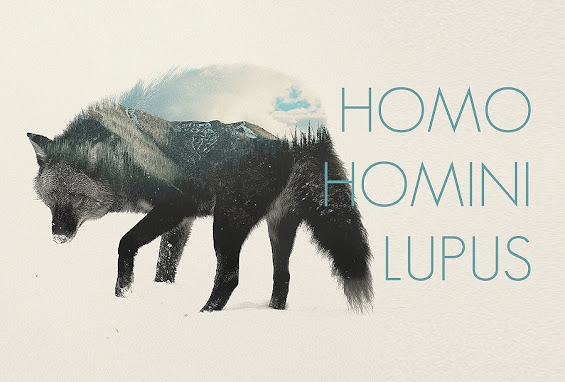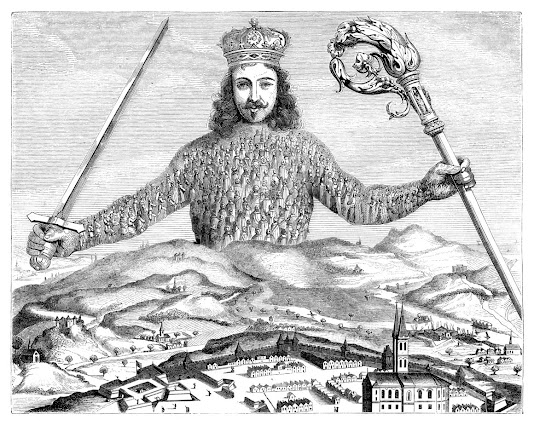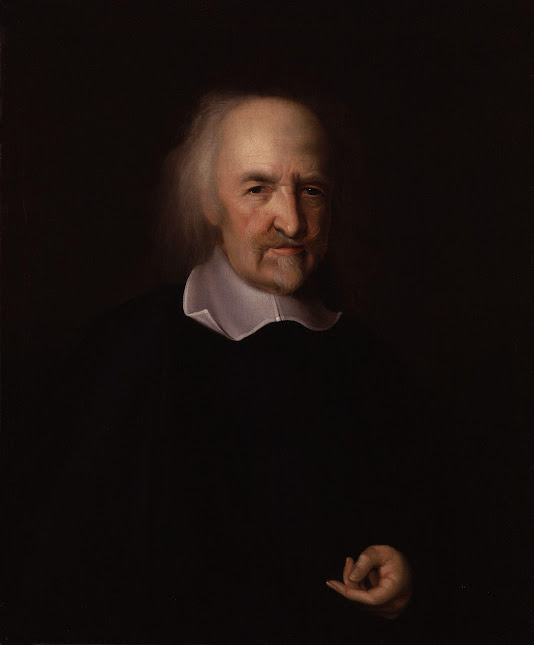"Homo Homini Lupus - Man is a Wolf to Man" - Chs. 1-3, 5 from "De Cive" by Thomas Hobbes
Man is a Wolf to Man
This excerpt from De Cive lays out the foundations upon which Thomas Hobbes builds his political theory. First and foremost is his idea of the "state of nature," and man's fundamental relation to other men as being one of hostility and violence, one reflecting the animal kingdom. Thus the role of government is to establish a pact by which individuals give up their personal freedoms for the security which the government can offer. As Hobbes and others are trying to find ways of giving secular foundations to government, moving away from religious states, the question arises, are these foundations strong enough for people to build their lives together on?
Hobbes begins by pointing out four qualities that men are born with that will play a role in the way each man interacts with others. These qualities are: "bodily strength, experience, reason, passion." Beginning from these qualities Hobbes is going to explore what is man's proclivity, or lack thereof, towards violence, society, and any fundamental laws which seems to govern him naturally.
Hobbes says that since we all find ourselves living in a society today that many think it natural that man form governments in this way. Hobbes, though, is not convinced. For sure, human beings need one another to survive and will come together to interact, but he says that a society is a relationship that is created through bonds and oaths with one another. These bonds are not natural to human beings, rather it is something which only results through education. Education into the benefits and curses of such bonds. 1 "Wherefore man is made fit for society not by nature, but by education. Furthermore, although man were born in such a condition as to desire it, it follows not, that he therefore were born fit to enter into it. For it is one thing to desire, another to be in capacity fit for what we desire." 2
Human Interactions are Always First Based on Selfishness
Contrary to what the Greeks thought about man being naturally a "political animal," i.e. that it was part of man's nature to form social contract with one another, Hobbes has a much dimmer view of human nature. If society was really about the good of the other man, and we were naturally drawn into loving relationship with others, then why do people prefer the company of some and not others? Why do people prefer to love those who benefit them back? Rather, fundamentally people come together because it benefits themselves, and only secondarily others. If people come together in the marketplace, it is for business. If people come together for fun, it is to please, more often than not, the people participating in it at the expense of others not present. If they meet to talk or share stories, then men seek to one up each other. If to talk philosophy, to pretend to be a master, or to attack another's skill or ideas. Society is then the inspiration of these selfish passions. 3 "...so clear is it by experience to all men who a little more narrowly consider human affairs, that all free congress arises either from mutual poverty, or from vain glory, whence the parties met, endeavor to carry with them either some benefit, or to leave behind them that same some esteem and honor with those, with whom they have been conversant..." 4
Rather, we must conceive of society as being reason for which men come together, the goodness of the will experienced for them individually. Hobbes sees all goods as "conveniences," whether intellectual or sensual. All we want is either pleasure of fame and honor. The problem with this is that pleasure, fame, and honor are goods that are like a zero-sum game. There is only so much of them, and when one person gets more another gets less. Therefore, everyone is at odds with one another to attain that which we all want. We can proper even more if we can force others to serve our gain as well. 5 "We must therefore resolve, that the original of all great, and lasting societies, consisted not in the mutual good will men had towards each other, but in the mutual fear they had of each other." 6
The Battle in the State of Nature
In this competition for goods then, Hobbes points out that even the strongest man may be easily killed by the weakest. In the state of nature in which man is pitted against man, we must recognize that everyone is on the chopping block to be physically taken out and killed. It is culture and society that lift some men above others. The human body, though, is fragile and it only takes one plunge of a sword to end it. Naturally, there will be some who refrain from such attacks that they too may not be attacked, recognizing their equality before violence and death. But there are others who naturally think of themselves as better than others, demanding honor and deference to themselves, often through violence. Thus, there is a battle of defense and dominance that naturally takes place. 7 This competition is not just physical, though. There is also a battle over the ideas and beliefs that govern human societies, whether that be religion, politics, or something else. Hobbes sees any type of dissent from others ideas, or refusal to go along with them, as equal to a type of insult against the man as you are rejecting their ideas. 8 "For not to approve of what a man says is no less than tacitly to accuse him of an error in that thing which he speaks..." 9 Thus in the battle for the goods of the earth, which are limited by nature, the winner will be the one who is the strongest and conquers the others by the sword.
Rights in the State of Nature
If man is by nature driven by his instincts for selfish goods, then the deepest of those is his own survival from injury or death. Therefore, to do such must be considered just and right, and must be the first and fundamental right of society. The means by which one secures this safety for himself must be determined by each man on his own, since if another man disagrees with me we have returned to that equal state of nature in which we are at odds and disagree, and I likewise judge him back. For in the state of nature, Hobbes says that "Nature has given to everyone a right to all." In so many words, Hobbes means that before society bound by covenant it was the up to the individual to decide what constituted their preservation and good.10 Therefore, the strongest has the ultimate say in what he does with everyone else. "... in the state of nature, profit is the measure of right." In other words, might makes right is the rule of the state of nature.
Hobbes points out, though, that living in such a state is not really beneficial. To be at war and contest with everyone over everything is not a way in which to enjoy good things. "If now to this natural proclivity of men, to hurt each other, which they derive from their passions, but chiefly from a vain esteem of themselves: you add, the right of all to all, wherewith one by right invades, the other by right resists, and whence arise perpetual jealousies and suspicions on all hands, and how hard a thing it is to provide against an enemy invading us, with an intention to oppress, and ruin, though he come with a small number, and no great provision; it cannot be denied but that the natural state of men, before they entered into society, was a mere war, and that not simply, but a war of all men, against all men. For what is war, but that same time in which the will of contesting by force, is fully declared either by words, or deeds?" 11
Hobbes makes it clear that the state of nature, that is being in a war against all, is not a state in which anyone wants to stay. Just as easily one might conquer someone, he himself might be stabbed in the back and be conquered. A miracle, then it would be, to even make it to old age. In order to get around this, there seems to be only two options for self-preservation. Either one may force others to be in service of them and protect them, or men may either enter through consent with one another to protect each other freely. 12 “Whosoever therefore holds, that it had been best to continue to in that state in which all things were lawful for all men, he contradicts himself. For every man, by nature necessity desires that which is good for him: nor is there any that esteems a war of all against all, which necessarily adheres to such a state, to be good for him. And so it happens that through fear of each other, we think it fit to rid ourselves of this condition, and to get some fellows; that if there needs must be war, it may not yet be against all men, nor without some helps.”13 Hobbes concludes chapter one by making it clear that men need other men in order to survive. This is going to be the foundations for his political theory.
Idea of the Natural Law
Hobbes begins chapter two by reflecting on the term "natural law." He says this term is often used in his day, but with little agreement to its meaning. Some hold the natural law to be the opinion of the wise, others the opinion of the majority, others as whatever suits them. Hobbes though defines the natural law as the most fundamental principles of what he calls "right reason." 14“Therefore the law of nature, that I may define it, is the dictate of right reason, conversant about those things which are either to be done, or omitted for the constant preservation of life, and members, as much as in us lies.”15
The first and foremost dictate of right reason in the natural law stems from Hobbes view of the state of nature, and is that we must seek after peace from violence for self-preservation, or self-defense in war if necessary. In order to obtain and live by this first and fundamental law of right reason, it is clear that man must surrender his other natural right to conquer others and their property. Even in surrendering this right to the state, Hobbes holds that all men still have a right to defend themselves against attack, for this is most deeply ingrained in our biological nature. For those who are not able to defend themselves, they should not be forced to endure attack, and thus the state must step in to stop the attacker through some sort of punishment. In a civil state, the right of punishment must be with the government, not the individual. The government does not need to negotiate with the person being punished, but only negotiate that other citizens must not impede the punishment of the government. 16 “But in a civil state, where the right of life, and death, and of all corporal punishment is with the supreme; that same right of killing cannot be granted to any private person.”17 Man is also not required to accuse himself, or put himself in a situation where his life may be ruined, yet the government may choose to torture him for such information.
In chapter three, Hobbes expands a little more on the laws of nature. He says that any rights one that attributes to himself, he must attribute to others. For others have entered into this social contract for the very same reasons of self-preservation, and would not enter into this contract otherwise. The laws of nature are also moral laws. Laws, which when considered rationally, are universal and unchanging, though the application of them may be subject to a diversity of circumstances, opinions, and inclination. 18 Thus, Hobbes says all men can agree in the abstract of what consists of virtue, mainly peace in those matters and actions which are required to have peace, but when it comes to particular situations, what some men call virtue others call vice, and what others call vice, some call virtue. Thus often there is no agreement in reality of what right reason dictates. Hobbes also thinks that the tradition of ethical philosophy from the Ancient Greeks has itself failed and been inadequate in the same way. Therefore, Hobbes concludes that the basis of all laws must go back once again to the preservation of peace and preservation of oneself from death. 19 “... where of I have only delivered such precepts in this place, as pertains to the preservation of ourselves against those dangers which arise from discord.” 20
The Union of Wills
In chapter five, Hobbes then says that since there is so much disagreement among men about practical situations, that therefore it is necessary to have peace through the subjection of every man’s opinions and will to a monarch, or to the agreement of the majority which Hobbes calls “council”. This is done by each man promising himself by contract to the will of the monarch or the council, inasmuch as he will even give his wealth and strength to support it. This is what Hobbes calls “union." By this means, the monarch or the council is able to unite the wills of men into the will of one man. Thus the foundations of a secular society have been laid out. 21 “Now union thus made is called a city, or civil society, and also a civil person. For when there is one will of all men, it is to be esteemed for one person, and by the word (one) it is to be known, and distinguished from all particular men, as having its own rights and properties; insomuch as neither any one citizen, nor all of them together (if we expect him whose will stands for the will of all) is to be accounted the city. A city therefore (that we may define it) is one person, whose will, by the compact of many men, is to be received for the will of them all; so as he may use all the power and faculties of each particular person, to the maintenance of peace, and for common defense.” 22
--------------------------
1 - Fieser, James and Samuel Stumpf. Philosophy: A Historical Survey With Essential Readings. Thomas Hobbes, De Cive. Chs 1, 2, 3, 5. Pg. 138.
2 - 138
3 - 139
4 - 139
5 - 140
6 - 140
7 - 140
8 - 141
9 - 140
10 - 141
11 - 142
12 - 142
13 - 142
14 - 143
15 - 143
16 - 144
17 - 144
18 - 145
19 - 146
20 - 146
21 - 147
22 - 147







Comments
Post a Comment